2018 CEO of the Year
It’s true: it can be lonely at the top. But the CEOs honored in these pages don’t believe in isolation—they use their leadership to bring together teams, to support and mentor junior executives, and to reach into the community. While being the one to make tough decisions is, at times, painfully difficult, our 12 CEO of the Year recipients take a collaborative approach in order to ensure their decisions have the support of company leaders and employees all through the ranks. Join us in paying tribute to these remarkable chief executives.
Lifetime Achievement
 John B. Lund
John B. Lund
President and CEO, America First Credit Union
John Lund took a job at America First Credit Union in 1975—and never left. He began working as a clerk for the credit union while he was in school, but stayed after graduation. There were always opportunities to learn new things, he says, and he steadily advanced up through the organization. Lund was named president and CEO in 2012.
That longevity and commitment to the organization is apparent in Lund’s passion for what he calls the credit union’s purpose: “Our purpose is to help individuals and families achieve financial wellbeing. We feel it’s very important to promote financial literacy and understanding and responsibility,” he says. “We want to create a long-term, lasting relationship with our members. And that purpose is very, very satisfying to me.”
America First aims to build “lifetime” relationships with its members, says Lund. “We take a long-term perspective on our success. We’re not just trying to meet a quarterly number or a yearly number.”
That long-term perspective has propelled the credit union to a dominant position. With 125 branches in Utah and Nevada, it boasts over 918,000 members. It’s the No. 1 credit union in Utah, and it’s the 10th largest credit union in the nation in terms of assets, says Lund, and the sixth largest in terms of membership.
One reason for that success is the credit union’s commitment to staying at the forefront of tech innovation. America First was only the second credit union in the nation to launch Apple Pay. It also developed a security tool called Card Guard, which gives members control over when and how their credit, debit or ATM cards are used. Over half a million America First members use online banking, and 350,000 members use mobile banking.
“John has a good technological background, and I think he is able to communicate with the techies of the organization and those of us who are not quite so technologically adept. John can simplify technical concepts and make them easier to understand,” says James Wendler, chair of the board of America First Credit Union.
Lund was an executive vice president when Wendler first joined the board 25 years ago, so Wendler has a deep perspective on Lund’s leadership at America First.
“John is recognized by my fellow board members as one of the most valuable assets the credit union has,” says Wendler. “He has an innate ability to pick the right people to do the right job. John is an excellent motivator of people. I think that comes from the fact that John is very trustworthy. People like John; people trust John. … He’s a person of high integrity.”
Large Company
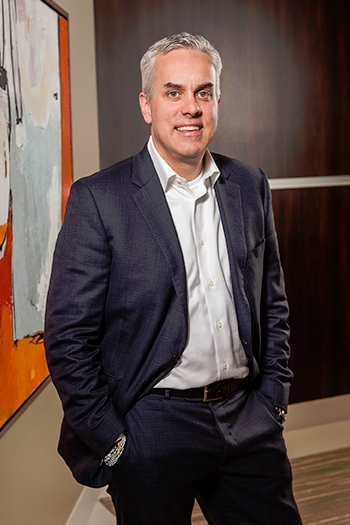 Scott Beck
Scott Beck
President and CEO, CHG Healthcare
For most of his life, Scott Beck thought he would follow in his oncologist father’s footsteps and become a doctor. At the University of Utah, Beck took some marketing and business classes and fell in love with entrepreneurship instead—but he never stopped wanting to work with physicians and in healthcare. Beck went to work at CHG Healthcare in 1999, a company that recruits and places healthcare providers in areas they are most needed, and served as CMO, group president, COO—and finally, CEO.
CHG Healthcare has thrived under Beck’s leadership. It has expanded internationally, surpassed $1 billion in annual revenue, and placed 14,000 providers across the country and internationally, in every state and specialty and in five foreign countries. This has provided healthcare to over 26 million people, says Beck, and is an achievement he takes particular pride in.
Also impressive is CHG’s employee retention rate: 84 percent, far above the 50 percent average for the healthcare industry. Beck attributes that loyalty to the fact that, at CHG Healthcare, employees are first—even above customers.
“My personal philosophy is that if we do a really good job of taking care of our people, our people will reward us by staying with us and taking really good care of our customers,” says Beck. “I think a lot of companies look at it the other way—it’s all about profits and customers. I’m happy to tell our customers that our employees are more important than they are, because they’re actually the ones that serve our customers.”
Beck says he didn’t realize the importance of people and culture until after getting his MBA—“nobody talked about building a connection with purpose,” he says—and began working. It was then he realized that creating a work environment built on “trust and helping people reach their full potential” is what leads to the best success.
For example, during the Great Recession, Beck says the company brought employees together in small groups to brainstorm about how to “tighten our belt and save resources … so that we could keep the family together.” After the recession, Beck saw the return on CHG’s investment in taking care of their employees by how many stayed with the company and helped it grow through its expansion.
“I think it really cemented this idea that putting people first isn’t just something we say or an emblem on the wall, but it’s something we believe and we use it to guide the decisions that we make inside of CHG,” he says.
Medium Company
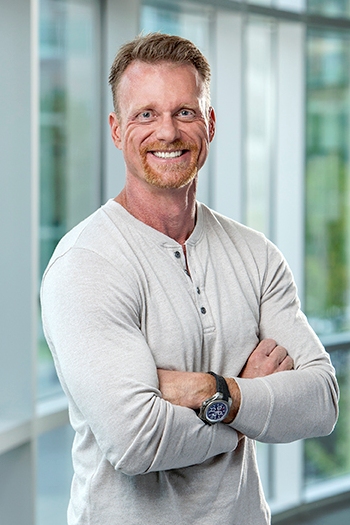 Jim Carlson,
Jim Carlson,
CEO and Co-Founder, Zurixx
After years of helping start and grow several other businesses—in industries ranging from multimedia publishing to financial sales—Jim Carlson and business partners, Cris Cannon and Jeff Spangler, decided to start a new venture in the financial education industry. It’s an industry that is “focused on teaching people how to be successful and how to create a legacy for their families,” says Carlson. “You are surrounded by so many good people that are truly trying to improve students’ lives. The ability to come in to work every day and watch people change their lives for the better is a rewarding experience, and why I initially started in this industry.”
Since Zurixx’s founding in April 2012, Carlson took on the role of CEO and has never looked back. The company has received nine recognitions over the past two years for exponential revenue growth, including being named the No. 1 fastest-growing company in Utah Business’ Fast 50, and the No. 43 fastest-growing company of the Inc. 500 in 2016 with $130.1 million in revenue.
As Zurixx enters a new phase after five years of rapid growth, Carlson feels excited about the company’s future—and that of its employees. Carlson makes sure that Zurixx isn’t just focused and invested in its students’ futures, but that it’s also invested in its employees. “Jim’s very good at taking people who have a desire to want to get better, and he recognizes that in them—sometimes even before they recognize that in themselves,” says Spangler, who is president and co-founder of Zurixx. “He’s able to put them in positions where they can take that desire and grow and expand. It creates a good team environment.”
And while Carlson is often in the difficult position of making tough business decisions, says Spangler, he remains interested and involved in the lives of his employees, making sure they have what they need—be that the funds and time for continued education or even for cancer treatments. When Hurricane Maria hit Puerto Rico in late 2017 (and thus, Zurixx’s Puerto Rico office), Carlson brought all 15 Puerto Rico-based employees and their families to Utah as soon as he could, while he went down to Puerto Rico with suitcases full of batteries, food, flashlights, generators and other goods. “When he sees opportunities to help out with different individuals within our organization, he’s very good at jumping in and making sure that that happens,” says Spangler.
As a company, Zurixx has given over $2.2 million to various organizations in the community such as Courage Reins and The Road Home.
“We also put an emphasis on employees taking work time to volunteer,” says Carlson. “We want our people to give back and we support those efforts wholeheartedly.”
Small Company
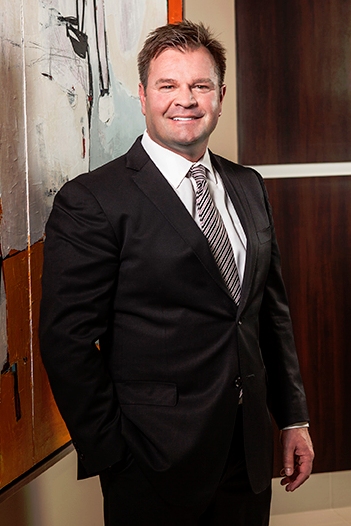 Andrew Limpert
Andrew Limpert
CEO and Director, FireFly Automatix, Inc.
When Andrew Limpert was a child, he and his friend Steve Aposhian would play baseball together—with no idea that later in their lives, they would work together on a turf harvesting agricultural technology company: FireFly Automatix.
Limpert’s career path was in investment banking, where he was happy being what he calls “mostly retired.” In that role, he founded, consulted on and funded many business ventures, and provided strategic financial consulting for several investment banks. He also served as the CFO at Profire Energy for eight years. But when his old friend Steve called him up in September 2015 to tell him about his technology company and ask for business advice, Limpert felt “called” to the business.
“I don’t feel I was looking for FireFly or AgTech, I feel I was called to it,” says Limpert. “I wouldn’t say I sought it out. I would say it called me out.”
As an investment banker, Limpert knew to expect that turning FireFly from a small, struggling technology company into a profitable AgTech leader would take “twice as long and twice as much money as you think,” he says.
“I was wrong. It was four times as long and four times as much money,” laughs Limpert. “It took a lot of guts to actually get involved in an industry I didn’t know much about. But what gave me a lot of confidence was looking at the intellectual DNA that we had in this company—the engineering team and the work ethic is unmatched.”
Under Limpert’s leadership, FireFly’s revenue has grown from $2.2 million in 2014 to over $15 million in 2017. The company added 35 new employees last year, won a 2017 Stoel Rives Utah Innovation Award, opened new service locations in Florida and Alabama, and went from manufacturing its equipment in four to six weeks to about four days. Limpert calls the increased manufacturing speed “a miracle.”
“Andrew brings the kind of experience and vision needed to help an innovative product not just gain a foothold within a competitive industry, but also to dramatically increase its market share,” says Gov. Gary Herbert.
Even aside from his business savvy, it’s the care Limpert puts into developing and cultivating relationships with people that makes him such an effective leader, says Matt Aposhian, Steve’s brother and president and COO of FireFly Automatix.
“Andrew is a people builder. He builds us all up and gives us confidence. He sees the potential in people and brings it out of everybody,” he says. “Just as an example, when he comes into the business in the morning, he walks the production floor. He talks to our welders and assemblers and get to know them on a personal level. He makes them understand the important work they’re doing for the company. He cares about people. He’s hard working, he’s very loyal and he’s dedicated.”
Large Tech Company
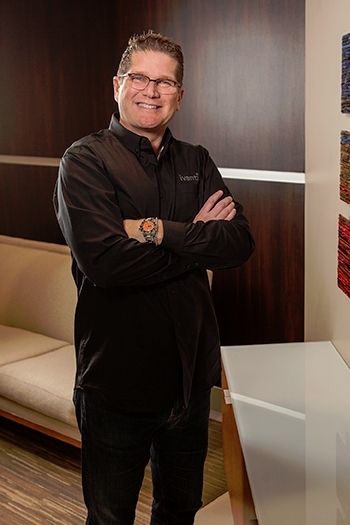 Steve Daly
Steve Daly
President and CEO, Ivanti
For Steve Daly and the company he leads, 2017 was a big year—and it was a year that topped off a half-decade of growth through strategic acquisition and new technology development. From 2012 through 2016, the company acquired six different tech companies. Then, in early 2017, Daly oversaw the formation of Ivanti through the merger of Landesk and HEAT Software in a deal backed by Clearlake Capital.
“This last year, we sold the company to new investors and they merged us with another company,” explains Daly. “That was a huge accomplishment for a lot of different people that had spent a lot of blood, sweat and tears building the company. And we had a lot of our own employees who had put their own money into it, so for me the greatest payoff was to see the trust that they had put into us, the work that they had put in, finally pay off for a lot of people.”
The acquisitions were part of Daly’s strategic vision to unify IT and security operations to better manage and secure the digital workplace. That vision is paying off, with the company doubling in size by all measures: Ivanti now has more than 2,000 employees in 23 countries and serves over 22,000 customers in all industries. It has reached nearly $500 million in revenue, with a goal to hit $1 billion in revenue.
“This past year we’ve grown the business almost two times its traditional size,” says Steve Morton, CMO of Ivanti. “We’ve really stretched the limit of our people and our processes. And Steve has been a very good steady hand through that process. … He gets the fact that he has to rally a team—he has to bring people together from multiple acquisitions and multiple companies.”
Part of the secret to Daly’s success, says Morton, is that he’s a well-rounded leader who approaches his role “from multiple dimensions, not just the traditional business-only approach, which is one of the reasons people love working with him.”
Indeed, Daly embraces curiosity and intellectual exploration. He says he changed his major five times while he was in college, and during his career he has worked in roles ranging from mechanical engineering to marketing, sales and strategic planning.
“Be curious. Try new things,” is his advice to those just starting their careers. “I’ve tried a lot of different things and I think it’s prepared me really well for the job I’m in today. I would say don’t get so worried about this roadmap for your career. Try new things and be very curious about what you can do, and it will all work to bring together a well-rounded person.”
Medium Tech Company
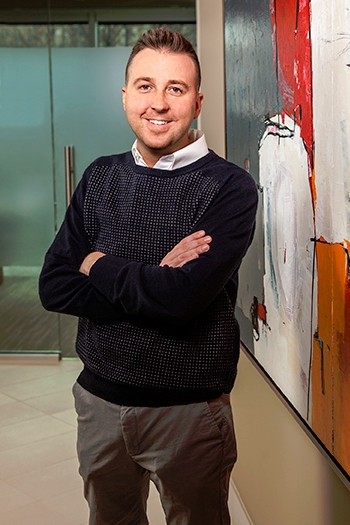 Ryan Westwood
Ryan Westwood
Co-Founder and CEO, Simplus
Ryan Westwood founded Simplus in 2014 and in less than four years has turned the company into a Platinum Salesforce Partner with Series A and B funding rounds under its belt. The company ranked as the No. 78 fastest-growing company in North America on Deloitte’s 2017 Technology Fast 500, and it more than doubled its workforce in 2017.
The key to Simplus’ success, says Westwood, has been a hyper focus on its market niche. “Some people think that as you get bigger, you have to broaden either your products or services. And there is a time for that. But I think especially for startups, you cannot be all things to all people. So we narrowed our focus, cut out about some services and revenue—about $1 million in revenue—and got hyper focused on only one market, and that’s what’s got us to where we are today,” he says.
Under Westwood’s direction, Simplus pared its focus down from three software vendors to just Salesforce—and then to a specific niche within Salesforce. “Within two months, we were all thinking, ‘Wow, that was a great decision,’” Westwood says.
Simplus’ funding rounds have enabled it to grow through targeted acquisitions—beginning in the third quarter of 2016, Simplus began a buying spree that snatched up Salesforce ecosystem partners BaldPeak, EDL Consulting and Basati. The Series B funding round, which finalized in late 2017 and totaled $17.3 million, enabled Simplus to nab Salesforce heavyweight CRM Manager.
Simplus’ investors include EPIC Ventures, Salesforce Ventures, Cross Creek Advisors and others. Kent Madsen, managing director at EPIC Ventures, says Westwood perfectly synthesizes a visionary leadership style with a practical, get-things-done management approach. “Ryan contains both these skills,” says Madsen. “Very few are able to do both.”
Westwood is a serial entrepreneur—Simplus is his fourth venture—and Madsen says each endeavor was both successful and unique, from tech-focused PCCareSupport to an online floral company. “I’ve been impressed and surprised at how well he’s been able to spread the gamut and build all these companies into successes,” he says.
As for Westwood, he’s focused on the future of Simplus. “We have the right product/market fit. We have a phenomenal team; we’re well capitalized,” he says. “I fully believe we have an enormous opportunity ahead of us at Simplus.”
But the thing that gives him the greatest satisfaction is the culture he’s helped create at Simplus, and the opportunities the company creates for its employees. “I love seeing our teams and our people advance their careers, advance their lives,” he says. “The thing I’m most proud of is creating an environment that’s positive and people are cared about.”
Small Tech Company
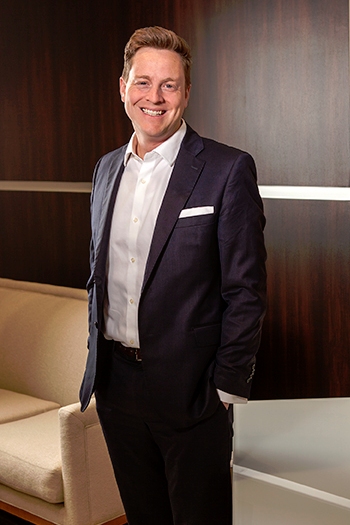 Chris Klomp
Chris Klomp
CEO, Collective Medical Technologies
When Chris Klomp left college with a degree in Economics, he embarked on a marvelous career at Bain & Company, transitioning to Bain Capital. He was a member of the firm’s private equity team, and he was really good at it.
“He was a star at Bain Capital,” says Clint Peterson, managing partner at Peterson Partners. “When he left, many of the people at Bain Capital said, ‘Whatever you do next, Chris, we want to back you.’”
Despite his success at Bain Capital, says Klomp, “In the back of my mind I had this itch. … I wanted to be an operator, instead of just an owner or a board seat holder or an investor. I wanted to be one of the ones really driving change.”
So Klomp left Bain Capital to help his best friends with Collective Medical, a company based around a software solution his two friends had developed. It was created to address the problem of patients who were accessing care at different emergency departments, without those EDs being able to coordinate, collaborate or even be aware of all the clinics where their patients were going.
“The notion of payers and providers really collaborating together around their common shared patients in a way that facilitated seamless transitions of care from hospitals to hospitals and ambulatory clinics and post-acute facilities—that really didn’t happen,” he explains. “And everyone really lacked the data, especially in real time, to really figure that out.”
While the software solution took direct aim at a persistent and complex problem, Klomp says getting potential customers to catch the vision was the real challenge. But the founding team persevered, travelling the country to pitch their product to health systems and care providers. Klomp says what kept him going was the belief that “if they could just catch the vision, if they could just see it, then they’ll jump on it and they’ll participate and amazing things will happen.”
Klomp strives to help his team catch the vision as well. “Leaders inspire,” he says. But leaders must balance that vision building with pressure and incentives to perform. “Great leaders show us what can be … and then they show us how to get there.”
That leadership and perseverance has paid off. Collective Medical now serves every health plan in the country, covering tens of millions of lives, he says, and the company has been able to amass “extraordinary data on outcomes.”
What keeps Klomp motivated is his belief in the incredible potential of Collective Medical. “We have the chance to build a truly iconic healthcare company, and one that changes the world on a fundamental level. That’s amazing, if you just step back and think about that,” he says. “Not just to talk about changing the world, but to actually change it and see it changing.”
Large Consumer Products Company
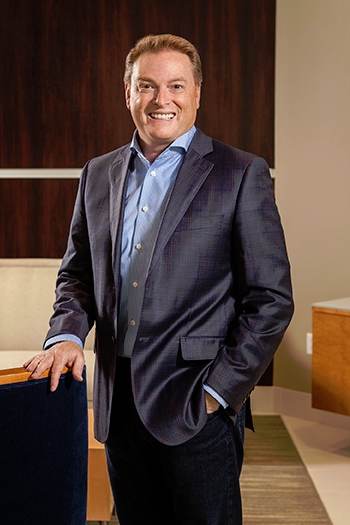 Randall Hales
Randall Hales
President and CEO, ZAGG, Inc
When Randy Hales was just starting his first job out of college, he had an extremely demanding boss. He flew all around the country, taking “airplanes like some people take buses to work,” he says. He would show up to work at 6 a.m. and wasn’t allowed to have a scrap of paper on his desk. While it was a strain then, says Hales, that experience of being held to a very high standard only helped him as he continued on with his career.
Today, Hales still holds himself to that same high standard. While not employing the same tactics as his old-school boss, he enjoys coaching, training and mentoring those he leads, setting strategic direction and helping people mature into their roles. “The same way I had some great mentors early in my career, I love helping to influence others to have that same opportunity to grow and develop professionally,” he says.
It’s perhaps that love of coaching that makes Hales so passionate about what he does: lend his business expertise to consumer product brands and help them flourish. “I’ve been very fortunate in my career. I’ve been able to go into these little companies that are just starting to grow, needing maybe a little extra leadership and extra guidance,” says Hales. He was introduced to ZAGG in 2010, joined the board, and then became president and CEO in 2012.
Since Hales has been at ZAGG, the company has enjoyed robust growth. ZAGG has made strategic acquisitions to diversify its product portfolio, including iFROGZ and mophie. While many in the industry were skeptical about the mophie acquisition, Hales and his team decided that mophie was a great brand that had been mismanaged from the operational side. Hales takes pride in the work ZAGG has done since the acquisition to bring mophie into the fold and recreate the brand.
When Hales joined ZAGG, yearly revenues were somewhere around $170 million—in 2017, the company took in close to half a billion. He’s also instilling what Brian Stech, chief commercial officer at ZAGG, calls “a winning culture” at the company. For instance, Hales and his team promised employees that when cumulative revenue hit $1 billion, they would build a new, state of the art office building. It was a big milestone that took nearly a decade to achieve, says Hales. But more impressively? The company’s second billion was achieved a mere 24 months after its first. And their new office building is indeed much beloved by employees.
“Randy is a very dynamic leader,” says Stech. “First, he’s a very empathetic leader. He truly cares about our employees, our customers, our shareholders and the community. He connects with everybody very easily. I think he drives accountability across the organization. He truly gives the best of himself and expects the best of his team.”
Medium Consumer Products Company
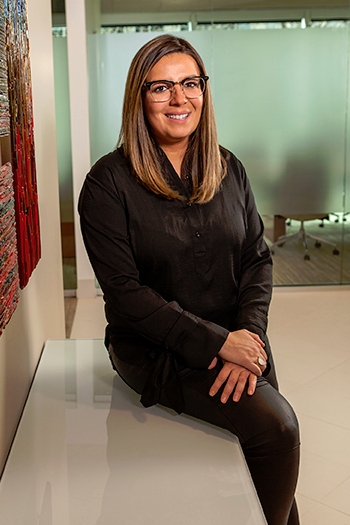 Vivien Böhme
Vivien Böhme
CEO, Böhme
It may look like fun and fashion, but the retail game is not for the faint of heart, says Vivien Böhme. “Women’s apparel is really fun, because you get to deal with designers, but there’s also a lot of stress because it’s a gamble. Until a customer touches it, you don’t know if it’s going to work or not, and sometimes the trends aren’t there,” she says. “Know your numbers in and out. Retail is a very hard numbers game masked by pretty theatrics, and you really have to put that numbers game first.”
When Böhme, a self-proclaimed “numbers queen,” took the reins a decade ago, the women’s apparel company was just a temporary location during the holiday season at a local mall. But encouraged by the success she saw during those weeks, Böhme went to Home Depot and learned the basics of everything from flooring to fixtures to build the company’s first permanent location.
Today, the business has 16 locations throughout the West and Midwest, as well as a thriving online presence, and boasts 30 percent in gains, 20 percent of which comes from brick-and-mortar growth.
There have been tough times, says Douglas Tilton, director of stores and operations for the company, but Böhme’s leadership has pulled the company through. “Retail is a very volatile career choice and the business is very up and down; it ebbs and flows with the economy, and we have certainly had our challenges here at Böhme. Vivien has been able to steer us through turbulent waters to be focused on what we were going after,” he says. “She was able to lead us through that difficult time to come out stronger on the other end.”
The success of the company validates the approach the company takes to help bring out the inherent beauty in each customer, Böhme says. “We’ve had customers come out of fitting rooms with tears streaming, saying, ‘yes, I finally found something.’” She says those moments give employees great satisfaction from being able to help women who “maybe other retailers have ignored … I think every woman deserves to be thought of as the most beautiful person in that minute. If Böhme can be, in that moment, part of that, we’ve done our job.”
But keeping that individual approach as Böhme has moved into different parts of the country has been a challenge, she says. “While my Utah customer zagged, my South Dakota customer zigged. … That was a struggle to figure out: the clean Utah woman with the very Bohemian South Dakota woman,” says Böhme. “We’ve figured out where the puck is going. It took years to trust our instincts again, but when we did, the clarity that came, and the sheer numbers that came, validated that we were right.”
Small Consumer Products Company
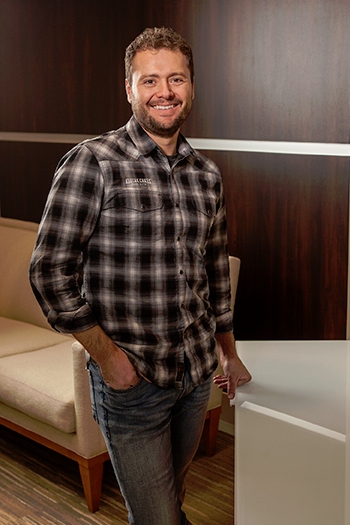 Joel Clark
Joel Clark
CEO, Kodiak Cakes
When Joel Clark was 8 years old, he was a fixture in the neighborhood, selling lunch sacks filled with his mother’s pancake mix to neighbors. “She always thought there was a market for more healthy products, but this was the ‘80s, and there were some but not as many,” Clark recalls.
When Clark was in college, his brother started Kodiak Cakes, but offered the reins to Clark a couple of years later. Surprised but interested, Clark jumped at the opportunity. The next 16 years would prove to be an exercise in grit as the company grew with agonizing slowness to its first million, and was bootstrapped every step of the way.
“That was a big, big challenge for me, just thinking, can I see it through, can I hang on long enough to see Kodiak Cakes off the ground,” he says. “I’m really grateful I did, and the last few years we finally started to see rapid growth.”
A turning point came in 2014, when the company got two major shots to the arm: an appearance on Shark Tank and the launch of the high-protein line of pancake mixes called Power Cakes. The former brought explosive new visibility, while the latter quickly became the No. 1 selling mix in the stores carrying it and made Kodiak Cakes the fastest-growing pancake mix company in the country.
While Clark knew he would relish the sense of entrepreneurship that comes with building a company, even amid highs and lows, he says he was surprised to find how much he has enjoyed leading the team that is growing the brand. “I used to think I would really dread being a manager of people. I used to be scared of that,” he says. “But it’s become one of the most fun parts of my job. I really love the people I work with and I really love building teams and thinking through how we want to build our culture at Kodiak Cakes, and that’s been a ton of fun for me.”
Cameron Smith, COO of Kodiak Cakes who has been with the company for nine years, says Clark’s willingness to get feedback from all levels and his obvious care for the people around him is the epitome of strong leadership and has helped Kodiak Cakes find success.
“Joel loves collaboration. He loves everyone’s ideas, everyone’s thoughts. Since the beginning, it’s been always about brainstorming. He’s never been a top-down leader,” says Smith.
The company continues to grow. Its frozen waffle line, launched last fall, has fast become a strong seller, and in some stores has even upended Eggo. Clark says his mother isn’t surprised. “I don’t think for one day she doubted this would work,” he says. “She’s been so supportive and believed in me and this company this whole time.”
Nonprofit – Business Services
 Nathan Rafferty
Nathan Rafferty
President and CEO, Ski Utah
On a day when the mountains are blanketed with a fresh coat of white powder, you won’t find Nathan Rafferty or anyone else from Ski Utah in the office—they’ll be hitting the slopes, practicing what they preach.
“We made an official policy that when it snowed over a foot, there was going to be an option for everybody in the office to go ski. So ski in the morning and obviously come back and work that afternoon and then into the evening to make up that time,” says Rafferty. “Maybe it doesn’t surprise people about our office, but it keeps the stoke level high and people’s passion, and gives them a reason to work at Ski Utah. I would hate to be sitting there looking out the window at the mountains and not have a chance to ski except on weekends. Two days a week? That’s not enough.”
It’s a quality evident to others in the industry, including Bob Wheaton, president and CEO of Deer Valley resort. “Nathan’s passion for skiing and the ski industry is extremely infectious, and that infection starts with the staff and grows from there. When you walk into the Ski Utah office, you’re not walking into an office, you’re walking into the ski industry. Everybody there is so engaged, and that feeling is fed by the daily direction, almost, that the staff get out and enjoy what they represent,” says Wheaton. “That’s the engagement Nathan brings to the industry and Ski Utah in particular.”
Rafferty’s passion for the sport and the industry built around it is obvious, which is part of what has made him so effective at promoting the state and the ski industry to locals, the nation and the world. The Utah native has always felt most at home on the slopes, and was pleasantly surprised to learn that there were careers in the industry. In 1994, he started at Ski Utah as an unpaid intern; when the previous president and CEO of Ski Utah stepped down in 2005, Rafferty had worked his way up through the nonprofit and was ready to take the reins.
Utah’s ski industry has “come of age” since the state hosted the 2002 Olympic Winter Games, but the last handful of years have seen broken record after broken record for attendance, visitors and spending. “The spending is more than a billion dollars now and that equates to state and local taxes that helps pave our roads, educate our kids,” he says. “It’s not just a small industry with a couple of rinky-dink ski hills like it was many decades ago, but it’s a well-known, worldwide, thriving business that contributes to our state’s economy.”
Nonprofit – Social Services
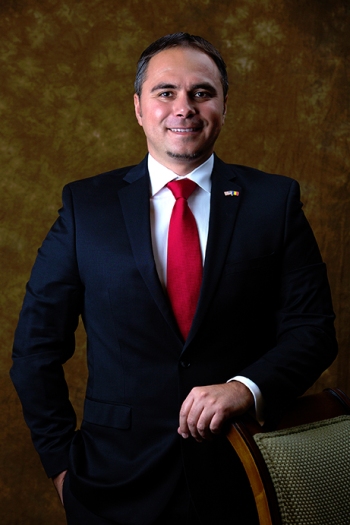 Mircea Divricean
Mircea Divricean
President and CEO, Kostopulos Dream Foundation and Camp Kostopulos
When Mircea Divricean worked as a counselor Camp Kostopulos one summer during college, he thought he was just there for a job. But one summer became two, and two became three. After graduating with a degree in finance, Divricean spent a year working in finance before realizing that something was missing.
“Something was just holding me back. Something just wasn’t fulfilling enough for me. It would have been great career path. I got into a great bank and it would have been a phenomenal opportunity, but there was a little bit of an empty spot not connecting to or being part of this beautiful ecosystem at Camp K,” he says.
Divricean returned to Camp Kostopulos in 2001, this time as a full-time employee, and climbed the ranks until being named president and CEO. But through the years—and Divricean will mark 20 years this summer since first stepping onto Camp K—one thing has remained unchanged: the inspiration from the people the foundation serves.
“They’re probably some of the best teachers in the world. They teach you kindness, they teach you honesty, they teach you mutual respect, they teach you love and appreciation. I get those lessons every day. Another lesson I get is resilience: when you have an individual who has to deal with certain challenges that are unimaginable to us—and we are so blessed that we don’t have to deal with those challenges—and yet you see a smile on their faces, you see a drive every day to go forward. That’s the most important thing of all,” says Divricean. “And that grit they have, that passion for life, is tremendous.”
Although he doesn’t strictly work in the financial sector, Divricean’s education hasn’t gone to waste. With the foundation’s financials on public display and donors wanting to make sure every hard-earned dollar is helping as many people as possible, Divricean says his background has proven to be invaluable in helping him make the organization flourish and grow. Since assuming the top job nearly five years ago, he has expanded new and existing partnerships and government contracts, but his primary goal is in improving resources and assistance for the participants in the Kostopulos Dream Foundation’s programs.
“What Camp K used to be, which was providing life skills and social skills, training and opportunities for people of all abilities, has become a full circle,” he says. “It’s not about learning life skills now, it’s about learning job skills and vocational skills and having the opportunity to be fully independent in your own life and living the best life you can.”





